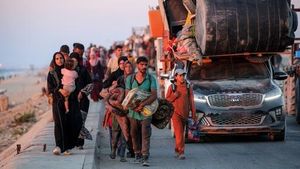Jaipur, Rajasthan has witnessed significant development initiatives aimed at improving urban infrastructure and supporting local communities. The Jaipur Development Authority (JDA) recently launched Rajasthan's first land pooling scheme, reflecting the state's commitment to sustainable urban planning.
Commencing on January 29, the land pooling scheme, enacted under the Rajasthan Land Pooling Scheme Act-2016, marks a pivotal step for the farmers of the region. For the first time, this initiative mandates the return of 45% of acquired land back to farmers or landholders, ensuring their active participation and safeguarding their interests during the urbanization process. Jaipur Development Commissioner Anandhi stated, "For the first time, a provision has been made to allocate 45% of acquired land back to farmers or landholders," underscoring the project's focus on collaboration between developers and local landowners.
The land pooling scheme is modeled after the successful framework seen in Gujarat, aimed at initiating structured and inclusive urban expansion. The project encompasses 163 hectares, including the villages of Shivdaspura, Barkheda, and Chandlai, where the construction of both 18-meter-wide and 24-meter-wide roads has begun. A financial approval of INR 28.60 crore has been allocated for this purpose. This ambitious endeavor promises to not only boost local infrastructure but also improve the quality of life for residents.
With the rising urban density leading to inevitable challenges, another significant initiative is the division of Jaipur city for e-rickshaw operations. Transport and Road Safety Minister Dr. Prem Chand Bairwa announced the creation of six zones aimed at alleviating traffic congestion caused by unregulated vehicles. Each zone will have specific parking spots and charging stations and will issue zone-specific QR codes to monitor and manage the number of e-rickshaws effectively. Dr. Bairwa remarked, "The new zoning system aims to address the traffic jams caused by unauthorized vehicles and ensures smoother flow of traffic," highlighting the urgent need for structured transport solutions.
Currently, Jaipur has registered 45,508 e-rickshaws, and the introduction of the QR code system is scheduled for January 28, 2025. By creating designated areas and effectively managing e-rickshaw operations, the government aims to improve urban mobility and facilitate smoother public transport, enhancing overall road safety.
On another front, Chief Minister Bhajan Lal Sharma spoke at the Dhakad Mahasabha held at Kota's Dussehra ground, announcing plans to allocate land for building hostels to promote education for talented youth from the Dhakad community. Emphasizing the community's contributions to national development, Sharma remarked, "This community's history symbolizes hard work, service, and discipline," acknowledging their efforts across various sectors beyond agriculture.
Sharma criticized the previous government’s failures to deliver on agricultural support, particularly concerning the PM-Kisan Samman Nidhi scheme. He expressed pride over the current government connecting over 7.5 lakh farmers to this aid, creating pathways for rural communities to prosper.
Representing the voice of the Dhakad community, Lok Sabha Speaker Om Birla praised their hard work and dedication, stating, "This community toils in the scorching sun and cold to produce food and strengthens the foundation of the country's economy." He encouraged local farmers to adopt scientific farming practices to drive agricultural innovation.
Through these initiatives, the government not only updates urban infrastructure but also fosters inclusive growth by acknowledging the contributions of local communities and enhancing their prospects for the future. The measures taken by the JDA aim to set standards for developmental frameworks and address urban challenges, ensuring the benefits of growth are widespread and sustainable.
With the launch of the land pooling scheme and the zoning initiatives for e-rickshaws, Jaipur is on the pathway to developing not just as a city but as a model for urban planning and transportation within the state. These actions signal the importance of community involvement and the effective management of resources as key components to successful urbanization.
Moving forward, Jaipur's development strategies aim to create more organized urban environments, enhancing connectivity and improving living standards for all residents. This multi-faceted approach serves as the framework for future initiatives, point toward sustainable growth, and recognizes the value of farmers and local communities as indispensable partners.



